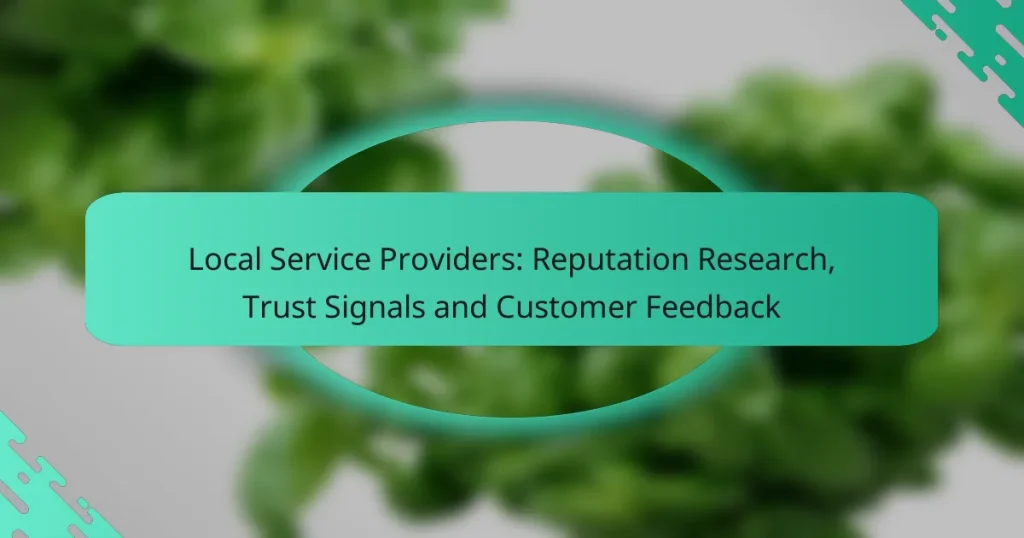Local service providers establish their reputation and trustworthiness by delivering consistent quality and engaging positively with customers. By effectively managing online reviews and fostering community connections, they create a reliable image that attracts new clients. Active participation on social media further enhances their credibility, showcasing authentic customer experiences that resonate with potential customers.
Local Service Providers: Trustworthiness Metrics, Comparison Criteria and Evaluation
Local Service Providers: Reputation Research, Trust Signals and Customer Feedback
Local Service Providers: Social Media Influence, Trust Building and Engagement
Local Service Providers: Red Flags, Reputation Indicators and Warning Signs
Local Service Providers: Referrals, Trust Factors and Selection Criteria
Local Service Providers: Industry Awards, Reputation Boost and Recognition
How do local service providers build reputation and trust?
Local service providers build reputation and trust through consistent quality, positive customer interactions, and community engagement. These elements create a reliable image that encourages potential customers to choose their services.
Customer testimonials
Customer testimonials are powerful tools for building trust. They provide firsthand accounts of experiences, showcasing the quality of service and customer satisfaction. Providers often display these testimonials on their websites or social media platforms to enhance credibility.
Encouraging satisfied customers to share their experiences can significantly impact a provider’s reputation. A simple request for feedback after service completion can yield valuable testimonials that resonate with prospective clients.
Online reviews
Online reviews on platforms like Google, Yelp, or local directories are crucial for establishing trust. Positive reviews can attract new customers, while negative reviews highlight areas for improvement. Providers should actively monitor and respond to reviews to demonstrate their commitment to customer satisfaction.
It’s beneficial for service providers to encourage clients to leave reviews after a job is completed. Aiming for a balanced mix of feedback can help maintain a trustworthy online presence.
Community involvement
Community involvement enhances a service provider’s reputation by showcasing their commitment to local values. Participating in local events, sponsoring community activities, or supporting charities can create a positive image and foster trust among residents.
Providers should consider collaborating with local organizations to increase visibility and demonstrate their dedication to the community. This engagement can lead to word-of-mouth referrals and a stronger local presence.
Transparency in pricing
Transparency in pricing is essential for building trust with customers. Clear and upfront pricing helps avoid misunderstandings and builds confidence in the service provider. Providing detailed estimates and explaining any potential additional costs can enhance customer satisfaction.
Service providers should ensure that their pricing structures are easy to understand. Offering a breakdown of services and associated costs can help clients feel more secure in their purchasing decisions, ultimately fostering a stronger reputation.
What are the best practices for managing online reviews?
Managing online reviews effectively involves actively engaging with customers and fostering a positive reputation. Key practices include responding to feedback promptly and encouraging satisfied customers to leave positive reviews.
Responding to feedback
Timely responses to customer feedback can significantly enhance your reputation. Aim to reply to reviews within a few days, addressing both positive and negative comments to show that you value customer input.
When responding to negative reviews, acknowledge the issue and offer a solution. This demonstrates your commitment to customer satisfaction and can help mitigate potential damage to your reputation.
Encouraging positive reviews
Encouraging satisfied customers to leave positive reviews can boost your online presence. Consider asking for reviews after a successful service interaction, as customers are more likely to share their experiences when prompted.
Incentives, such as discounts or loyalty points, can motivate customers to leave reviews, but ensure that these practices comply with local regulations. A simple follow-up email thanking customers and requesting feedback can also be effective.
How can local services leverage social media for trust?
Local services can build trust through social media by actively engaging with their audience and showcasing authentic customer experiences. This approach fosters a sense of community and credibility, which is essential for attracting and retaining clients.
Showcasing customer stories
Sharing customer stories on social media allows local services to highlight real-life experiences and positive outcomes. This can be done through testimonials, case studies, or user-generated content, which resonate more with potential clients than traditional advertising.
Consider creating short video clips or posts that feature satisfied customers discussing their experiences. Aim for a mix of formats, such as before-and-after photos or written testimonials, to keep the content engaging and relatable.
Engaging with the community
Active engagement with the local community on social media helps build trust and rapport. This can include responding to comments, participating in local events, or sharing community news that aligns with your service offerings.
Utilize local hashtags and join community groups to increase visibility and foster connections. Regularly posting updates about community involvement or partnerships can enhance your reputation as a trusted local service provider.
What role does certification play in local service trust?
Certification enhances trust in local service providers by demonstrating their adherence to industry standards and regulations. It assures customers that the provider has met specific qualifications and is committed to maintaining quality and safety in their services.
Industry certifications
Industry certifications are credentials awarded by recognized organizations that validate a service provider’s expertise and compliance with best practices. For example, a plumber may hold a certification from a national plumbing association, indicating they have completed necessary training and examinations.
When evaluating service providers, check for relevant certifications that align with the specific service you need. These credentials can vary widely by industry, so understanding which certifications are most respected in your area can guide your decision-making.
Local business licenses
Local business licenses are permits issued by government authorities that allow a service provider to operate legally within a specific jurisdiction. These licenses often require compliance with local regulations, including health and safety codes, which can vary by city or state.
Before hiring a local service provider, verify that they possess the appropriate business licenses for your area. This not only confirms their legitimacy but also provides an added layer of protection, ensuring they are accountable to local laws and standards.
How do service guarantees enhance customer trust?
Service guarantees enhance customer trust by providing a safety net that assures clients of the quality and reliability of services. When customers know they can receive compensation or a remedy if expectations are not met, they are more likely to engage with a service provider.
Money-back guarantees
Money-back guarantees are commitments from service providers to refund customers if they are not satisfied with the service. This type of guarantee can significantly reduce perceived risk, making customers more willing to try a new service. For example, a cleaning service might offer a money-back guarantee if the client is unhappy with the results.
When considering a money-back guarantee, it is essential to review the terms and conditions. Look for details on how long customers have to request a refund and any specific criteria that must be met. Clear communication of these terms can further enhance trust.
Service warranties
Service warranties provide assurance that a service will be performed to a certain standard and may cover repairs or replacements if issues arise within a specified period. For instance, a plumbing service might offer a warranty that covers any leaks for six months after the job is completed. This adds an extra layer of confidence for the customer.
When evaluating service warranties, check the duration and coverage details. Some warranties may only cover specific types of issues, so understanding what is included is crucial. Additionally, ensure that the warranty is backed by a reputable provider to maximize its effectiveness in building trust.
What are the risks of poor reputation for local service providers?
A poor reputation can significantly harm local service providers by leading to a loss of trust and a decrease in customer loyalty. This can result in reduced revenue and long-term viability challenges, as clients often choose providers based on perceived reliability and quality of service.
Loss of customers
When a local service provider has a poor reputation, they are likely to experience a decline in customer retention and acquisition. Customers tend to seek alternatives when they perceive a lack of trustworthiness or quality, which can lead to a significant drop in clientele.
For instance, a plumbing service with negative reviews may lose customers to competitors with better ratings. This shift can be particularly detrimental in smaller markets where options are limited, making reputation even more critical.
Negative online presence
A negative online presence can severely impact a local service provider’s ability to attract new clients. Online reviews and social media feedback play a crucial role in shaping public perception, and negative comments can deter potential customers from engaging with the business.
Providers should actively manage their online reputation by responding to reviews and addressing customer concerns. Ignoring negative feedback can exacerbate the situation, leading to a cycle of declining trust and further reputational damage.
How to measure the impact of reputation on business success?
Measuring the impact of reputation on business success involves analyzing various metrics that reflect customer perceptions and behaviors. Key indicators include customer retention rates, brand loyalty, and overall sales performance, which can provide insights into how reputation influences business outcomes.
Customer retention rates
Customer retention rates are a critical metric for assessing the impact of reputation on business success. A strong reputation often leads to higher retention, as satisfied customers are more likely to return and recommend the service to others. Businesses should aim for retention rates of 70% to 90%, depending on the industry.
To improve retention, companies should focus on delivering consistent quality and addressing customer feedback promptly. Regularly surveying customers about their experiences can help identify areas for improvement and reinforce positive perceptions.
Common pitfalls include neglecting customer service or failing to follow up on complaints. Businesses should implement a systematic approach to monitor retention metrics and adjust strategies accordingly to maintain a positive reputation and keep customers engaged.






